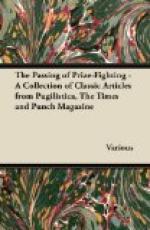When I recovered Sir HENRY was bending over me and pouring brandy down my throat. COODENT was sitting on the ground binding up his legs. “My dear old friend,” said Sir HENRY, in his kindest tone, “this Yorkshire is too dangerous. My mind is made up. This very night we all start for Mariannakookaland. There at least our lives will be safe.”
CHAPTER III.
We were in Mariannakookaland. We had been there a month travelling on, ever on, over the parching wastes, under the scorching African sun which all but burnt us in our treks. Our Veldt slippers were worn out, and our pace was consequently reduced to the merest Kraal. At rare intervals during our adventurous march, we had seen Stars and heard of Echoes, but now not a single Kopje was left, and we were trudging along mournfully with our blistered tongas protruding from our mouths.
Suddenly Sir HENRY spoke—“SMALLUN, my old friend,” he said, “do you see anything in the distance?”
I looked intently in the direction indicated, but could see nothing but the horizon. “Look again,” said Sir HENRY. I swept the distance with my glance. It was a sandy, arid distance, and, naturally enough, a small cloud of dust appeared. Then a strange thing happened. The cloud grew and grew. It came rolling towards us with an unearthly noise. Then it seemed to be cleft in two, as by lightning, and from its centre came marching towards us a mighty army of Amazonian warriors, in battle-array, chanting the war-song of the Mariannakookas. I must confess that my first instinct was to fly, my second to run, my third, and best, to remain rooted to the spot. When the army came within ten yards of us, it stopped, as if by magic, and a stout Amazon, of forbidding aspect, who seemed to be the Commander-in-Chief, advanced to the front. On her head she wore an immense native jelibag, tricked out with feathers; her breast was encased in a huge silver tureene. Her waist was encircled with a broad girdle, in which were stuck all manner of deadly arms, stuhpans, sorspans, spihts, and deeshecloutz. In her left hand she carried a deadly-looking kaster, while in her right she brandished a massive rolinpin, a frightful weapon, which produces internal wounds of the most awful kind. Her regiments were similarly armed, save that, in their case, the breast-covering was made of inferior metal, and they wore no feathers in their head-dress. The Commander held up her hand. Instantly the war-song ceased. Then the Commander addressed us, and her voice sounded like the song of them that address the butchaboys in the morning. And this was the torque she hurled at us,—




